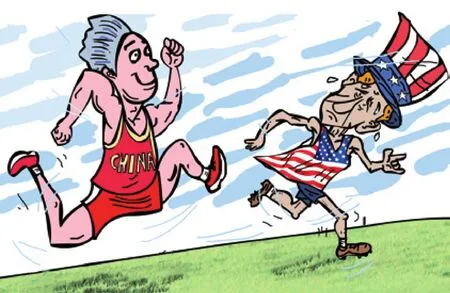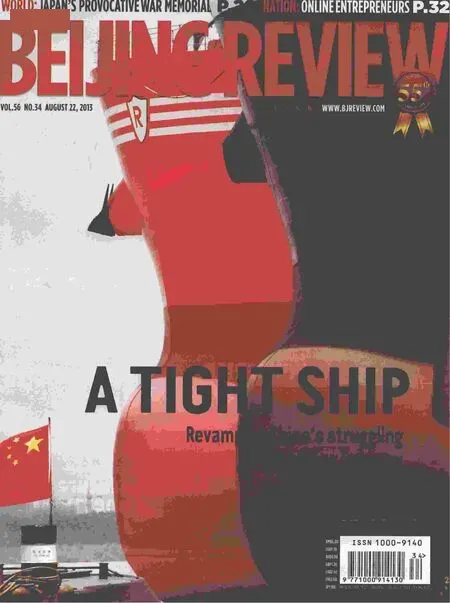Who Wants to Be Number Two?Imagining a future beyond the superpower paradigm
2013-12-06ByKerryBrown
By Kerry Brown

The author is an op-ed contributor to Beijing Review and executive director of the China Studies Center at the University of Sydney
Since the end of the Cold War in the late 1980s and early 1990s, it is widely accepted that the United States has been the world’s sole superpower. This is based on two indisputable facts. The first is the size of its economy, which has been utterly dominant over this period and constitutes approximately a quarter of global GDP. The second is the size of its military. The United States has the army,navy and air force powers to project its force over the rest of the world. It spends more on defense than the next 10 countries put together.It has dominance in technology and in capability. Uniquely, it has the capacity to be involved in security issues throughout Europe, Asia,Australia and Africa. It is the one power with this kind of global reach.
U.S. decline
In the last decade since the tragedy of September 11 in 2001, however, the United States’ dominance has been questioned. It has been stretched with two costly wars in Iraq and Afghanistan, which have lasted longer than expected and proved more complex in their outcomes both politically and economically.President Barack Obama made it clear upon his election in 2008 that he wished to see a phased withdrawal of all U.S. troops from Afghanistan,the last ongoing military action by U.S.-led forces. This is due to happen by 2015. In addition,the U.S. economy has been under immense stress because of the sub-prime crisis which started to appear in 2007, and decimated the country’s finance sector and its exports in the next two years.
The United States has returned to steady growth in 2012 and the first two quarters of 2013, and looks likely to post stronger growth than expected this year. However, vice President Joe Biden admitted during a meeting with Chinese vice Premier Wang Yang at the China-U.S. Strategic and Political Dialogue in Washington D.C. in July that the economy is still suffering large structural challenges, with high levels of debt and the continuing need to create jobs and support manufacturing.
Commentators are keen to talk of this as an era of U.S. decline, and of there now being a bipolar or tri-polar world. In 2009, in particular,during the G20 Summit held in London and before President Obama’s visit to China later that year in November, there was talk of a G2,with China as the world’s second most powerful nation. Much of this was based on the fact that aggregately China has become the world’s second largest economy, and one of the main sources for global growth, in the last five years.It is natural to impute China with an enhanced and prominent global rank.
However, Chinese leaders at the time were keen to stress that G2 was not something they recognized or aspired to. Many of them pointed out that China remained a country with per-capita levels of wealth that put it around number hundred in global rankings. So why would it wish to push itself toward a role now taken by the United States? Its priorities remained attending to its own internal issues of growth, sustainability and balance.
Being number two is never easy in any system. There are always suspicions about how second ranking powers or people harbor ambitions to replace the number one in the future.There is a natural feeling that no one can stay in the top position forever, and that there is an inbuilt proclivity to decline in the top players after their moment of glory. Many worry that this decline might be marked by unrest, tension and conflict, as happened when the UK was replaced by Germany and then the United States in the early part of the 20th century, an event which unleashed con flicts in Europe and resulted in two massive world wars. The world cannot bear the costs of this sort of transition.That, at least, seems clear.
Multi-polar world
For this reason, the talk earlier in the 2000s of a “multi-polar” world might be worth revisiting.The Cold War era’s two clear, stark poles of influence, with the Soviet Union on one side and the United States on the other, seems more like an aberration now, rather than some standard template. Before and after this starkly bipolar moment, there was much more confusion, with some powers dominant in trade areas, some in military areas, and some through their political and diplomatic influence. In an era of accelerated and deeper globalization, where we talk of“ flat-earth technologies” and free trade agreements eroding national barriers, is there much sense in talking of dominant countries that can then dictate the direction of the world in the future? There seems to be much more competition now between states in these areas.

This focus on global rather than national priorities is increasingly important in view of the nature of likely future threats. Most agree that the world is unlikely to implode into the sorts of mass violence we saw in the previous century. U.S. scientist Stephen Pinker in his book The Better Angels of Our Nature talks of the widespread decline of violence as a means to resolve differences in the modern world. The horror of World War II was enough to force countries to agree that this,along with the guaranteed annihilation of nuclear war, militated against any large-scale mobilization in the future. The threats now are from localized terrorism, and then from famine and, most disturbing of all, the effects of climate change. These respect no geographies, and are only soluble with global action.Even superpowers cannot cut themselves off from the impact of these problems.
It is unlikely in the near future that there will be a coherent unified world government responding to these shared global risks, just as it is unlikely that nation states will slowly disappear. But there will be profoundly different ways that we think about nations and about their role in the world. The starkly different visions of economic strategy and governance that the Soviet Union and the United States had to differentiate them no longer exist. Most governments agree that they have to deliver sustainable growth and that they need policies that support their people’s aspirations to have the best modern life they can.
This sharing of a collective understanding of what development is about means that in the next decade, it is likely that China will become the world’s largest economy, but that the United States will continue to be the dominant military and political player. Its overall per-capita levels of wealth and its global series of alliances will remain strong. For this reason, the management of the relationship between the United States and China in ways which are harmonious and mutually productive will be the key relationship in the foreseeable future.
But around these key relations, there will be a series of players who will all be immensely important for different reasons—Russia because of its immense resources, the EU for the size of its market, Brazil and India because of their importance as emerging economies.In many ways, we have to wean ourselves off global rankings, and that we have to have a global rank. Economic power will be important,but not the sole reason for a country being in fluential. There will be ways in which countries like Australia have major roles to play because of their strategic location and their influence on global environmental issues.
The EU economic crisis over the last few years has reminded the world that while big countries get all the attention, the smaller ones should never be neglected. The woes in the euro zone were created not in Germany, France or the UK but in Greece. Fighting with the issues of debt in this, one of the smallest member states of the EU, has absorbed the attention of the whole group of 28. A system which manages to hear the voices and pay attention to the interests of smaller states is hugely important.In that sense, the multi-polar world we are moving toward will also be a more secure one. The world watching one or two powers exclusively is an inattentive and distracted one, and that cannot be a good thing. ■
杂志排行
Beijing Review的其它文章
- promoting Trade Foreign trade can play a bigger role in ensuring stable economic growth
- Mind Your Own e-Business! More job hunters start business careers on the Internet
- Seeking a Cure Cities are upgrading drainage systems to battle chronic flooding
- ABANDON SHIp ? NOT SO FAST China is set to revitalize its beleaguered shipbuilding sector?
- Trying a New Way Beijing NGO launches a charity program to encourage carpooling
- A Needed Reform Interest rates must be fully liberalized to meet the demands of the market
